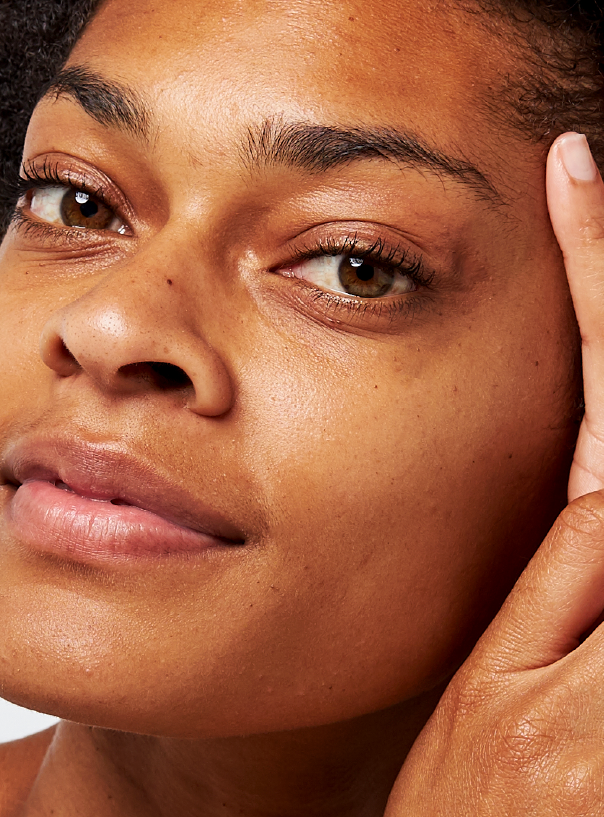Education
Can You Use Azelaic Acid Everyday? Advice From Our Experts | Apostrophe
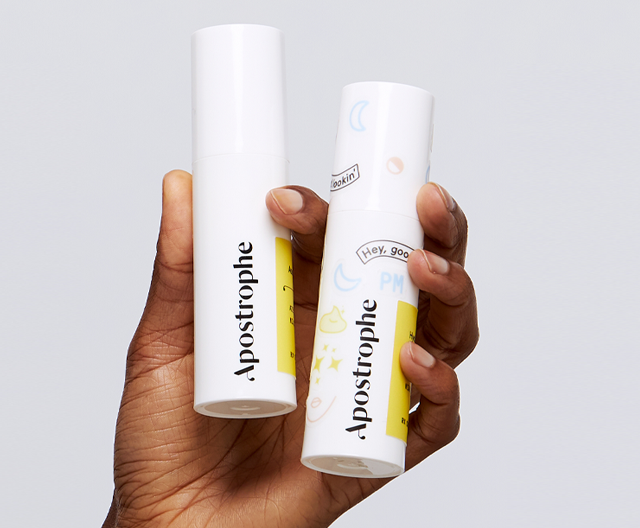
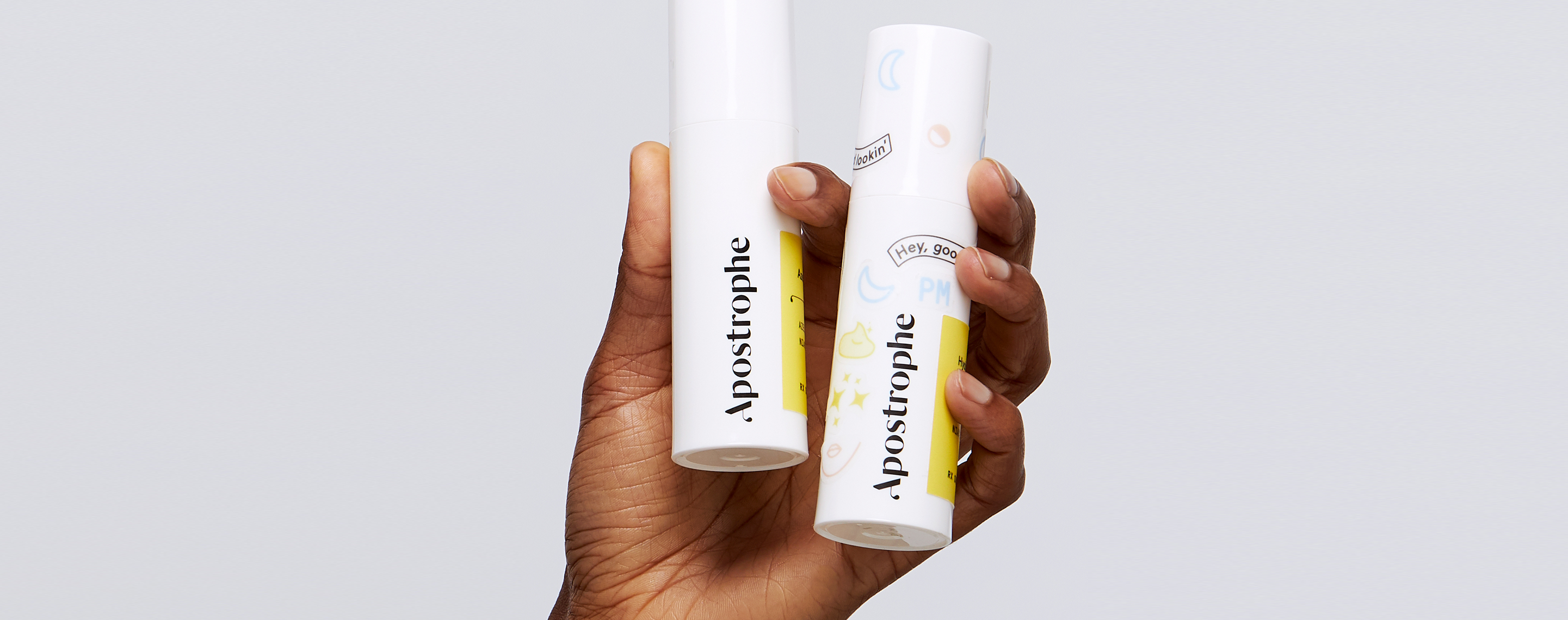
SHARE
Education
Can You Use Azelaic Acid Everyday? Advice From Our Experts | Apostrophe
Medically reviewed by Aimee Paik, MD
Written by Apostrophe Team
Last updated 1/2/2023
Once you begin to address every skin concern and start on the path toward healthy skin, the list of therapeutic acids claiming to be the most effective can seem absolutely endless. Each acid, from salicylic acid to lactic acid, has its own unique features.
If you’re considering adding azelaic acid to your repertoire, you might be wondering about its benefits (there are many), its uses (for many skin conditions such as acne, rosacea, melasma, and more), if you can use it every day (yes, but it depends), and when to use azelaic acid (check with your dermatologist). We can answer all of those questions and more (in much more detail). In this guide, you’ll learn what azelaic acid does, how often you should be using it on your skin, and whether it’s right for you.
What is Azelaic Acid?
Azelaic acid is more than just another skincare ingredient—it offers a whole host of incredibly beneficial qualities perfect for many skincare goals.
It’s antimicrobial. This acid is also known for its antimicrobial properties, which helps keep your skin microbiome balanced.
It’s a pregnancy class B skincare ingredient, meaning it’s considered safe to use while pregnant or breastfeeding and widely approved by OBGYN professionals.
It’s a tyrosinase inhibitor, which helps to prevent hyperpigmentation by interfering with the production of melanin. That means dark spots become less vulnerable to getting any darker. However, it does not make the user any more sensitive to the sun (although our experts want to remind you to continue using a healthy amount of SPF as usual).
It plays a role in cell turnover, which can help reduce the appearance of cystic acne and scarring.
Azelaic acid has a lot to offer, and it might be the right choice for you. You can get azelaic acid at a lower percentage over-the-counter or a prescription-strength option from a dermatologist. In the following sections, you can determine whether or not you should be using it every day.
What Does Azelaic Acid Do for the Skin?
Azelaic acid can help soothe inflammatory and bacterial conditions such as acne and rosacea. It has also proven to be particularly effective in dealing with a skin condition known as post-inflammatory erythema—which you may know as the purple, pink, or red spots often left in the wake of an acne attack, but also sometimes due to dermatitis or sun damage.
In addition to its anti-inflammatory benefits, azelaic acid also treats these conditions by inhibiting pigment production by melanocytes. Melanocytes are the skin cells that produce melanin and cause darker pigmentation. With this winning combination, you’ll find that azelaic acid can do a stunning job at keeping skin bright, clear, and blemish-free.
When applied topically, azelaic acid can be very effective. That being said, it’s considered to be a much gentler ingredient with fewer side effects like peeling and blistering. Azelaic acid carries a unique precision that allows it to tread the line between gentle and irritating, carefully.
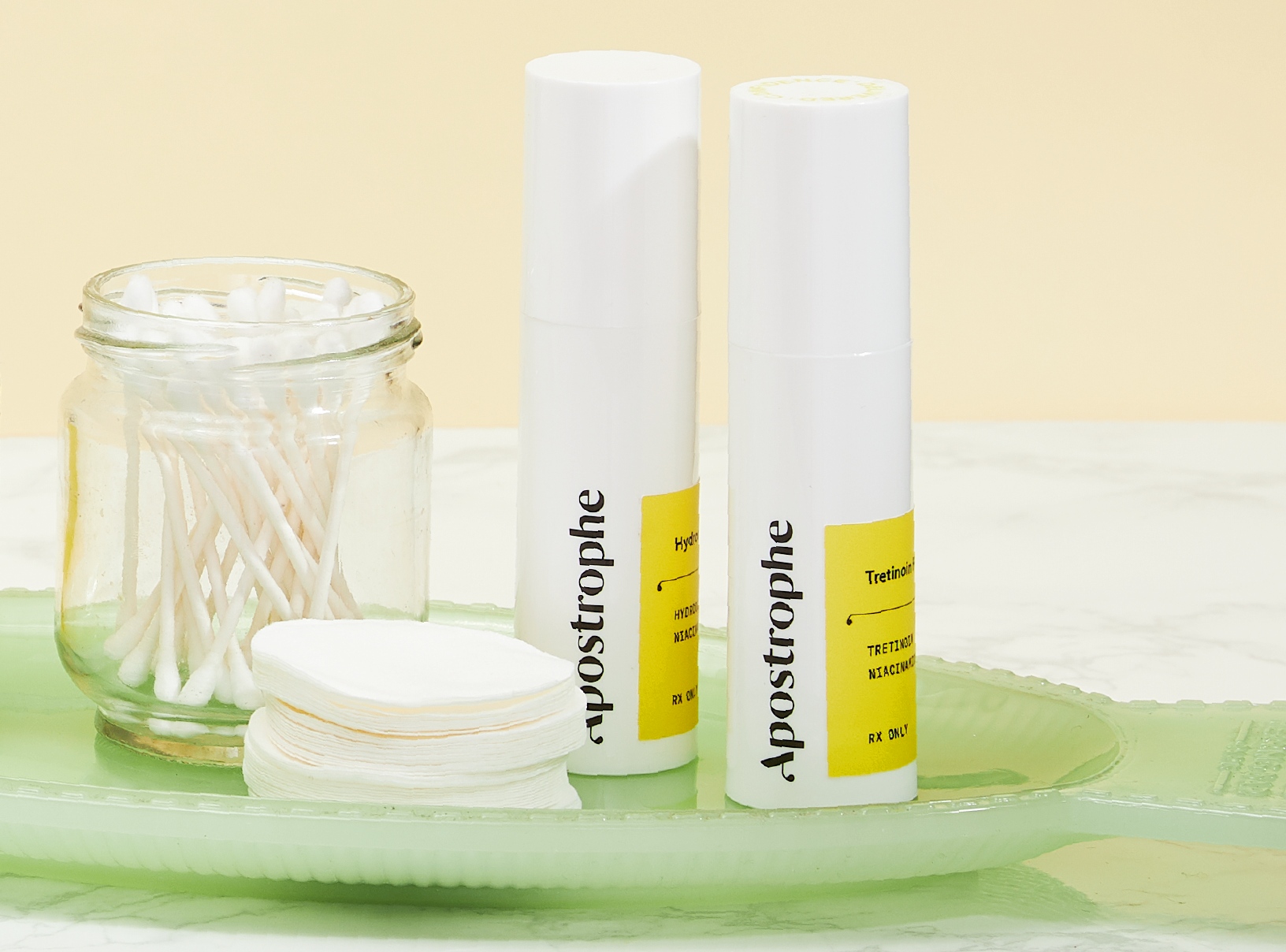
HYPERPIGMENTATION TREATMENT
Target dark spots and hyperpigmentation with customized prescription treatment.
Is Azelaic Acid Exfoliating or Moisturizing?
Unlike some acids, azelaic acid is not an AHA (alpha hydroxy acid)—which are commonly used for their exfoliating properties. Azelaic acid is also not a BHA (beta hydroxy acid), either, which has a different chemical structure despite being derived from similar, organic sources.
The main difference between the two types of acids is that AHAs are water-soluble, while BHAs are oil-soluble. Essentially, that means AHAs can dissolve in water while BHAs can dissolve in oil. So, AHAs are best fitted for clearing bacteria, dead skin cells, and other contaminants from the skin, while BHAs are adept in penetrating clogged pores and clearing out the oils blocking them.
Uniquely produced by naturally occurring yeast, azelaic acid can break down oils and exfoliate while simultaneously clearing the area of bacteria. So, azelaic acid does the job of both an AHA and a BHA despite being neither.
The one property of azelaic acid to keep in mind is that—because it does so much to clarify the skin—it is not inherently moisturizing. The main benefits of azelaic acid are its pore cleansing and anti-inflammatory properties, which is why it's used as an acne treatment and to treat conditions like rosacea and melasma.
For those with sensitive skin types or new to treatment, it’s important to always moisturize after use. That’s the key to dealing with the mild dryness that can occur at the beginning of treatment.
How Often Should You Use Azelaic Acid?
One of the most important things to recognize when trying to find the right skincare product or regimen for you is this: we all have different skin, and everyone’s skin has different needs and sensitivities. A skincare product that works for one person might not work for you.
It’s important to understand what your particular skin type needs so that you can determine the dosage that’s right for you.
Those with a very sensitive skin type, for example, may want to acclimate to azelaic acid, and so our professionals suggest beginning with a regimen of applying only two or three times a week.
For most skin types, however, azelaic acid is gentle enough to be used daily, incorporated into one's morning or evening face washing routine. Some experts even recommend using it twice a day.
The bottom line: this is an acid that can be used as an all-over treatment every night. Although azelaic acid may take 2-3 months for its results to become visible, the moment you see how effective it can be, you’ll be glad you gave this acid a chance.
Is Azelaic Acid Irritating When Used Frequently?
The answer is yes...and no. It depends on your skin sensitivity, your dosage, and your frequency of use.
The strongest dosage of azelaic acid is 20% and prescription-only. Many OTC skincare products contain only 10%. It’s compatible with most other skincare products, so there’s no need to worry about altering or replacing any elements of your current skincare routine.
The only way azelaic acid might butt heads with any other treatments is in the form of skin irritation. If this occurs, our professionals advise dialing back your use of harsher products (like chemical exfoliators) and slowly reintroducing them as your skin becomes more used to your azelaic acid treatment. If you’re looking to combine salicylic and azelaic acid, or azelaic acid with retinoids, do some research first to avoid skin irritation completely.
Craft Your Ideal Treatment Plan with Apostrophe
All this talk of acids can sound a little scientific (and even downright complicated)—we get it. It’s not easy to figure out exactly what skin care products are right for your beautifully unique skin. We all know to wash, exfoliate, and moisturize, but there’s a whole world of additional acids that could be doing some serious heavy lifting to make your skin as clear and radiant as it can be. It can be a real challenge to track them all down on your own, and it takes so much time to find out if they even work for you. You might have questions about different products’ uses such as the benefits of using azelaic acid vs. retinol (or both).
That’s why Apostrophe wants to step in and do the hard work for you. We provide users with a personalized skin care plan specially designed to accommodate your skin’s needs. Let Apostrophe do the heavy lifting for you, using the board-certified dermatologists on their platform to make sure you have a complete recipe to make your skin the best it can be.
For a small fee of $20 and nestled in the comfort of your home, taking care of your skin has never been more manageable. Apostrophe saves you endless trial and error with drug-store, over-the-counter skin care products, time-consuming trips to the dermatologist, and the anxiety of worrying whether you’ll ever find a routine that works. Take the first step on the path to beautiful, clear skin today with Apostrophe!
Sources:
PubMed. Azelaic acid. A review of its pharmacological properties and therapeutic efficacy in acne and hyperpigmentary skin disorders.
https://pubmed.ncbi.nlm.nih.gov/1712709/
NCBI. Postinflammatory Hyperpigmentation.
https://www.ncbi.nlm.nih.gov/pmc/articles/PMC2921758/
Apostrophe. Slather - Everything You Need to Know About Azelaic Acid. https://www.apostrophe.com/slather/everything-you-need-to-know-about-azelaic-acid/
Shop this post
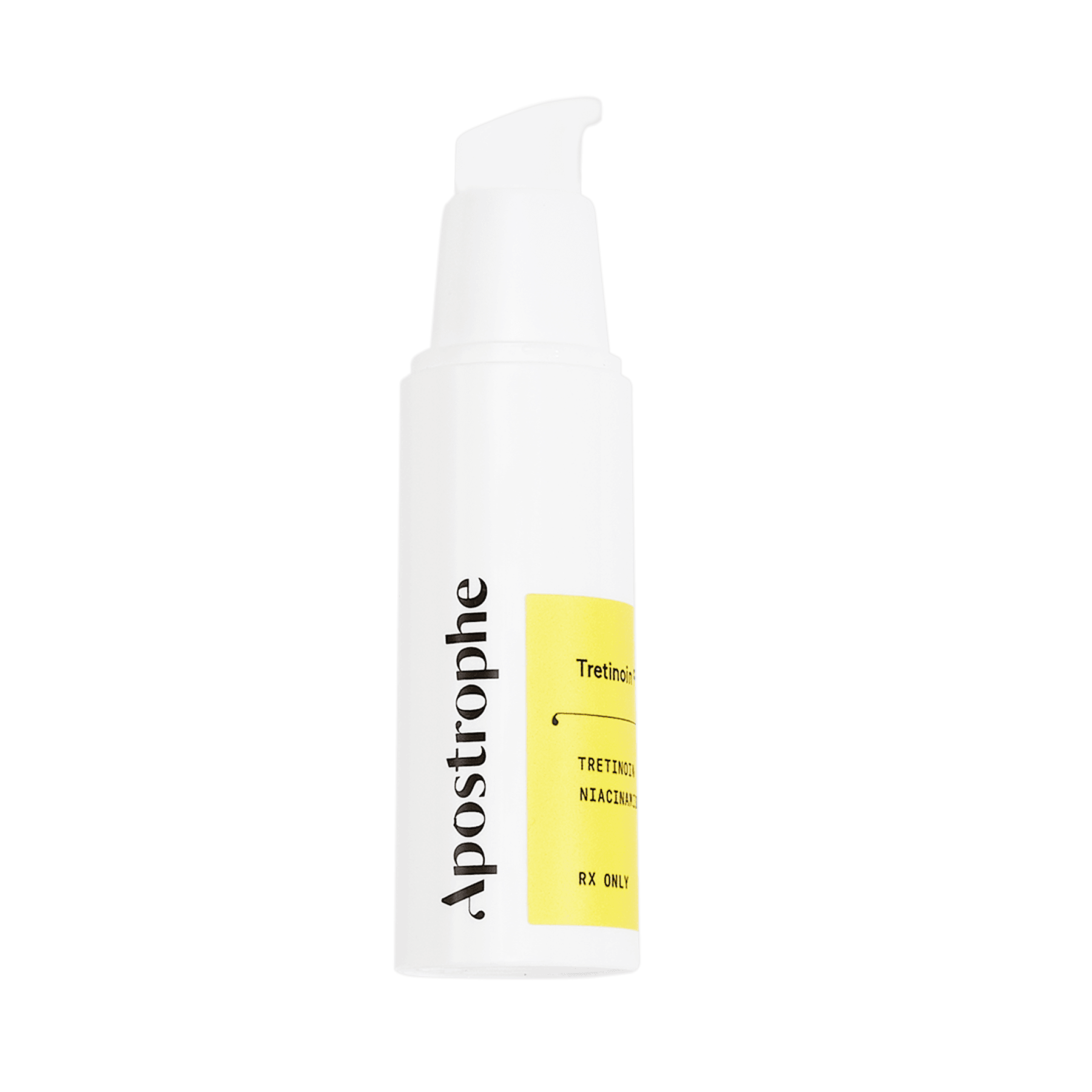
Finacea (azelaic acid)
Like what you just read? Sign up for our email list to get the scoop on skincare science delivered straight to your inbox.

Education
What is milia?
What is milia? Today, we’re jumping into one type of bump that you may have heard about most commonly in infants — milia.
Read More
Education
Best moisturizer for acne-prone skin
If you have combination acne-prone skin, figuring out which moisturizer is best for your skin might be tough. In this guide, we break down the best moisturizer for combination, acne-prone skin.
Read More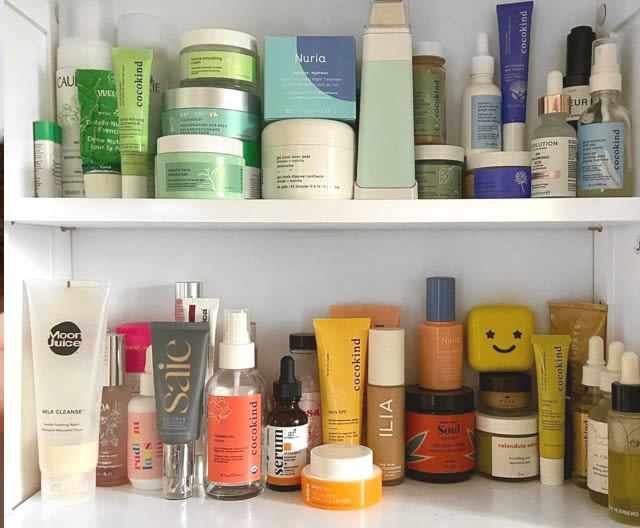
Education
How to build a face care routine
As you get into skincare, it might seem overwhelming, especially trying to figure out the order you're supposed to apply products in. Below, we detail how to build a face care routine for your skin!
Read More